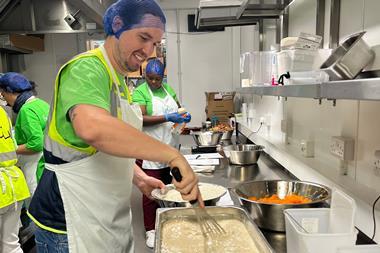>>retailers cannot work alone in improving diets. Susan Bromley, marketing development manager, Co-operative Group
Only individuals can take the decision to choose to live a healthy lifestyle. However, that doesn’t mean others don’t have a role to play. Government, consumer groups, retailers, manufacturers and caterers can help, not by nannying but by enabling people to make choices while accepting that in some instances there is the need to adopt a precautionary approach.
The Co-op is in the middle of the great diet and health debate. Our stores are a key part of the communities in which we trade. We are in the unique position of being able to see the debate from all sides.
We are very clear that we are unable to act alone in solving the nation’s diet and
health problems. Joined-up thinking and action is required and it can be frustrating when that doesn’t happen as quickly or effectively as it should. But we do take our role as educator and influencer seriously.
Take the current hot topic of the provision of fresh produce in smaller stores. We have been driving the 5-a-day message. For the last two years we have run a fresh produce sales incentive in all our stores, which has resulted in a 12% growth in fresh produce sales, most of which have come from smaller stores. Small stores select six promotions every three weeks from 18 available to encourage purchase and trial of fresh produce. We even include fresh produce in our TV ads. And next year we
will be launching a Produce Academy aimed at improving quality, ranging and handling of the lines across our business.
But people have to be pre-disposed to buy fresh fruit and veg and that choice is not just down to price, whatever the size of store and location. The objective has to be to show that healthy food can act as ‘food that fuels’, that it isn’t just for pleasure and shouldn’t be seen as a risky purchase.
This provision is also hampered by the legal requirement that fresh fruit and vegetables have to satisfy marketing standards on appearance, shape and size. A lot of perfectly good fresh produce, the use of which would facilitate lower prices, doesn’t even reach our shelves because legally it is not allowed to. Isn’t that defeating the object of the exercise?
We are also acutely aware of the issues of social exclusion and ‘food deserts’ and actively support community food initiatives. Key to our approach is to enable people to make an informed choice and so take responsibility for their actions through our clear, open and honest information.
We work on the premise that this choice, coupled with the broad range of information available, can support a better diet from our range of products. To take one example, we are the only retailer to provide fat, calorie and salt content per serving on the front of all our own-brand food labels.
So please don’t tell us as a retailer that we aren’t aware, or concerned about, issues such as obesity, diabetes, mental health, heart disease and hypertension brought on by diet. We are, but we can’t work in isolation and sometimes our ability to make a change for the better is affected by our buying scale and a lack of willingness from some suppliers to critically evaluate and improve what they offer us.
If we have these issues, then how can the smaller, independent retailer with little buying scale act? This is where joined-up thinking and collaboration are key, and also common sense should come into play.
Good retailers respond to changing customer needs, but the most successful retailers anticipate and can even influence those needs. As we continue to play our part in the great diet and health debate, this ability to influence and support customer needs, coupled with a presence at the heart of communities, means that we, and other convenience retailers, can support broad dietary improvements.
Only individuals can take the decision to choose to live a healthy lifestyle. However, that doesn’t mean others don’t have a role to play. Government, consumer groups, retailers, manufacturers and caterers can help, not by nannying but by enabling people to make choices while accepting that in some instances there is the need to adopt a precautionary approach.
The Co-op is in the middle of the great diet and health debate. Our stores are a key part of the communities in which we trade. We are in the unique position of being able to see the debate from all sides.
We are very clear that we are unable to act alone in solving the nation’s diet and
health problems. Joined-up thinking and action is required and it can be frustrating when that doesn’t happen as quickly or effectively as it should. But we do take our role as educator and influencer seriously.
Take the current hot topic of the provision of fresh produce in smaller stores. We have been driving the 5-a-day message. For the last two years we have run a fresh produce sales incentive in all our stores, which has resulted in a 12% growth in fresh produce sales, most of which have come from smaller stores. Small stores select six promotions every three weeks from 18 available to encourage purchase and trial of fresh produce. We even include fresh produce in our TV ads. And next year we
will be launching a Produce Academy aimed at improving quality, ranging and handling of the lines across our business.
But people have to be pre-disposed to buy fresh fruit and veg and that choice is not just down to price, whatever the size of store and location. The objective has to be to show that healthy food can act as ‘food that fuels’, that it isn’t just for pleasure and shouldn’t be seen as a risky purchase.
This provision is also hampered by the legal requirement that fresh fruit and vegetables have to satisfy marketing standards on appearance, shape and size. A lot of perfectly good fresh produce, the use of which would facilitate lower prices, doesn’t even reach our shelves because legally it is not allowed to. Isn’t that defeating the object of the exercise?
We are also acutely aware of the issues of social exclusion and ‘food deserts’ and actively support community food initiatives. Key to our approach is to enable people to make an informed choice and so take responsibility for their actions through our clear, open and honest information.
We work on the premise that this choice, coupled with the broad range of information available, can support a better diet from our range of products. To take one example, we are the only retailer to provide fat, calorie and salt content per serving on the front of all our own-brand food labels.
So please don’t tell us as a retailer that we aren’t aware, or concerned about, issues such as obesity, diabetes, mental health, heart disease and hypertension brought on by diet. We are, but we can’t work in isolation and sometimes our ability to make a change for the better is affected by our buying scale and a lack of willingness from some suppliers to critically evaluate and improve what they offer us.
If we have these issues, then how can the smaller, independent retailer with little buying scale act? This is where joined-up thinking and collaboration are key, and also common sense should come into play.
Good retailers respond to changing customer needs, but the most successful retailers anticipate and can even influence those needs. As we continue to play our part in the great diet and health debate, this ability to influence and support customer needs, coupled with a presence at the heart of communities, means that we, and other convenience retailers, can support broad dietary improvements.
















No comments yet